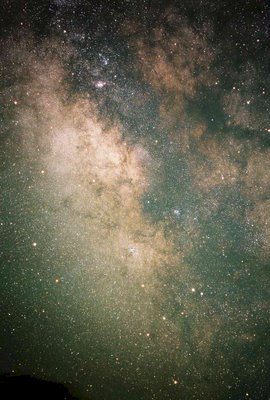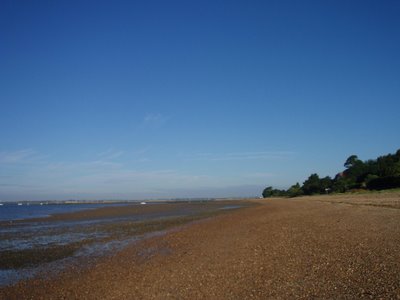
The beginning of the film ‘Contact’ provoked awe when I first watched it, on a trip to Boston in 1997. It is the ultimate in pull-back shots, beginning from the surface of the earth and just going back, and back, and back, and back. Out of the solar system, past the heliosphere, through the Milky Way, beyond the point where our galaxy is just a small dot in a haze of other galaxies. I had thought that I had a good sense for the scale of the universe, but when I lost my sense of depth about three-quarters of the way through the sequence, I realised that I had been deluding myself. The sense of scale that we need to try to comprehend when we consider our position in the universe is quite possibly unattainable to the human mind. Our Galaxy, the Milky Way (above), has some 400 billion stars. There may be 125 billion galaxies in the universe. There are probably more stars than there are grains of sand on earth. I find these numbers meaninglessly large. Perhaps we need Monty Python to help us through:
Just remember that you’re standing on a planet that’s evolving
And revolving at nine hundred miles an hour,
That’s orbiting at nineteen miles a second, so it’s reckoned,
A sun that is the source of all our power.
The sun and you and me and all the stars that we can see
Are moving at a million miles a day
In an outer spiral arm, at forty thousand miles an hour,
Of the galaxy we call the ‘Milky Way’.
Our galaxy itself contains a hundred billion stars.
It’s a hundred thousand light years side to side.
It bulges in the middle, sixteen thousand light years thick,
But out by us, it’s just three thousand light years wide.
We’re thirty thousand light years from galactic central point.
We go ’round every two hundred million years,
And our galaxy is only one of millions of billions
In this amazing and expanding universe.
The universe itself keeps on expanding and expanding
In all of the directions it can whizz
As fast as it can go, at the speed of light, you know,
Twelve million miles a minute, and that’s the fastest speed there is.
So remember, when you’re feeling very small and insecure,
How amazingly unlikely is your birth,
And pray that there’s intelligent life somewhere up in space,
‘Cause there’s bugger all down here on Earth.
Contemplation of these facts provokes some questions – and perhaps a little smile. “When I consider thy heavens, the work of thy fingers, the moon and the stars, which thou hast ordained; What is man, that thou art mindful of him?” The Christian understanding of the world was born in an environment radically different to the one that we inhabit today. What are the implications of this shift for Christian faith?
In traditional terms, Christians look forward to the resurrection of the dead on the last day. This says something very important about our bodily future – that our existence as embodied beings now will somehow be recognised on that last day. Also in traditional terms, that last day will come after the apocalypse, when the last trump shall sound, the anti-christ shall be overthrown and Jesus will return to judge the living and the dead. The early Christians – such as Paul, who writes about this in his letter to the Thessalonians – believed that this last judgement would happen in their lifetimes. Of course, we are still waiting.
This hope or expectation of a last judgement is something which has been of great comfort to many believers over the years, and I would not wish to argue against it. What I would say, however, is that it is not something which I find moving – it is not something that reaches into my heart, it is not something that makes a difference to how I shape my life.
As well as the difference in size of the universe that we are living in, there is a difference in the scale of time of comparable scale. When the church was getting established, it was considered that the world was created, in roughly the form it has now, some few thousand years ago – and it’s end would be a similar number of years in the future. Whereas now consider that in fact the earth was created some 4.6 billion years ago, the universe perhaps some 15 billion years ago, and we do not have any conception of when it will end, if indeed that question has meaning.
My point is to do with the ‘background drama’ against which we might understand the story of Jesus of Nazareth. The early church placed that story in the setting of their culture, and we must do the same. Our culture has radically changed its conception of time and space, and our understanding of the significance of Jesus must change too.
It is rather as if we were watching a Punch and Judy show, and we were caught up in the drama, and that small stage bounded our world. And suddenly we were pulled back to see that this stage was placed in the centre circle at Wembley Stadium – the story just doesn’t have the same imaginative impact any more. And then we are pulled back to a satellite orbiting above London, and really the question of what is going on in the Punch and Judy show on some grass in North West London has to do something really rather remarkable if it is going to attract our attention. And the camera keeps pulling back.
Our imaginations, in terms of time and space, are set to a different scale. And my imagination is engaged more by an episode of Star Trek than by a consideration of who will be Left Behind. Perhaps the apocalypse will come, the last trumpet will sound, and the four horsemen will come riding out. Or perhaps not. I am quite confident that it will not happen in my life time, and that, if, at the end of all things my Lord raises me up, I shall indeed be delighted.
I don’t believe that Christians have yet begun to explore this difference, not to a substantial degree. That may await my generation and after – those who were born after Armstrong had walked on the moon. We are in a different place now; the old language and habits don’t have the same purchase any more. Yet the Christian claim is that Jesus shows us what it means to be human – and what is the nature of God. I believe He will do so for as long as there are human beings.
Let us be human. We cannot be anything else. Perhaps the key thing is that we are open-ended, and our futures are not yet determined for us.









